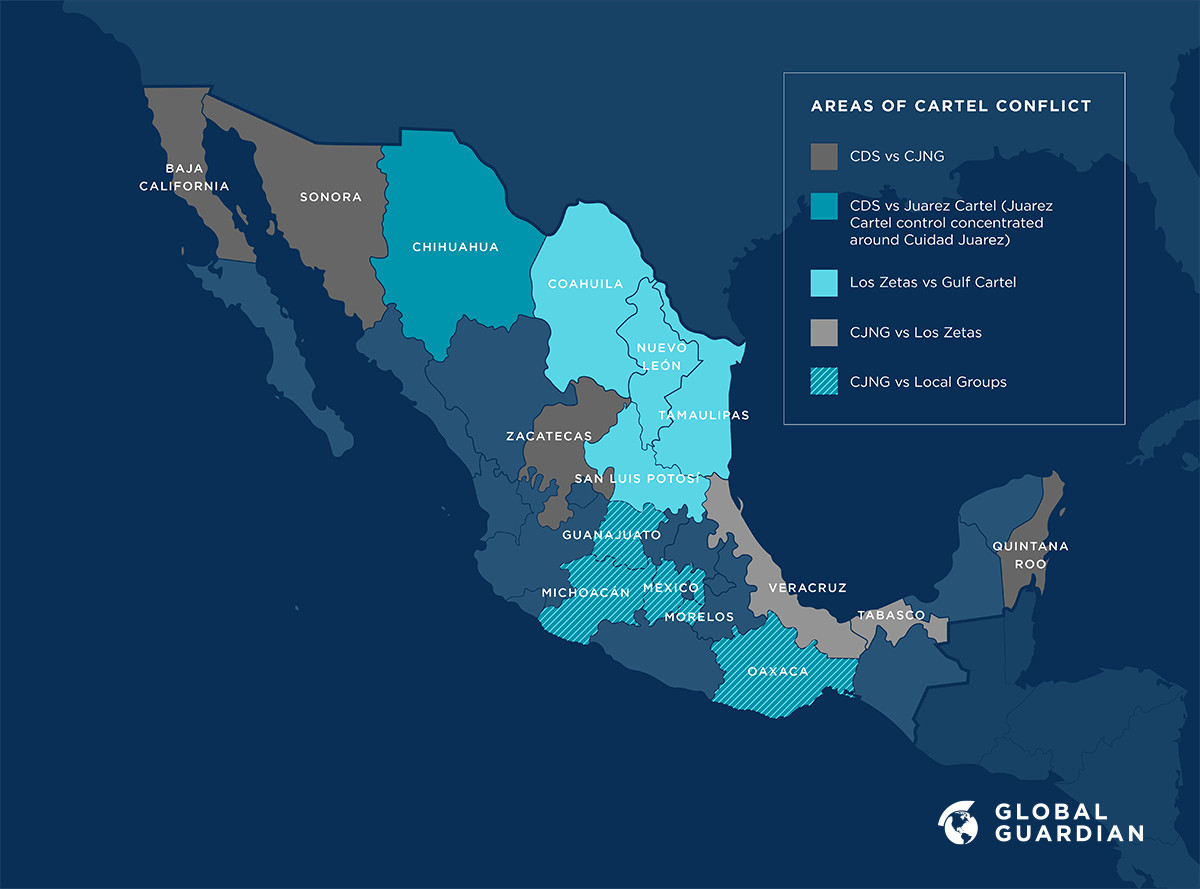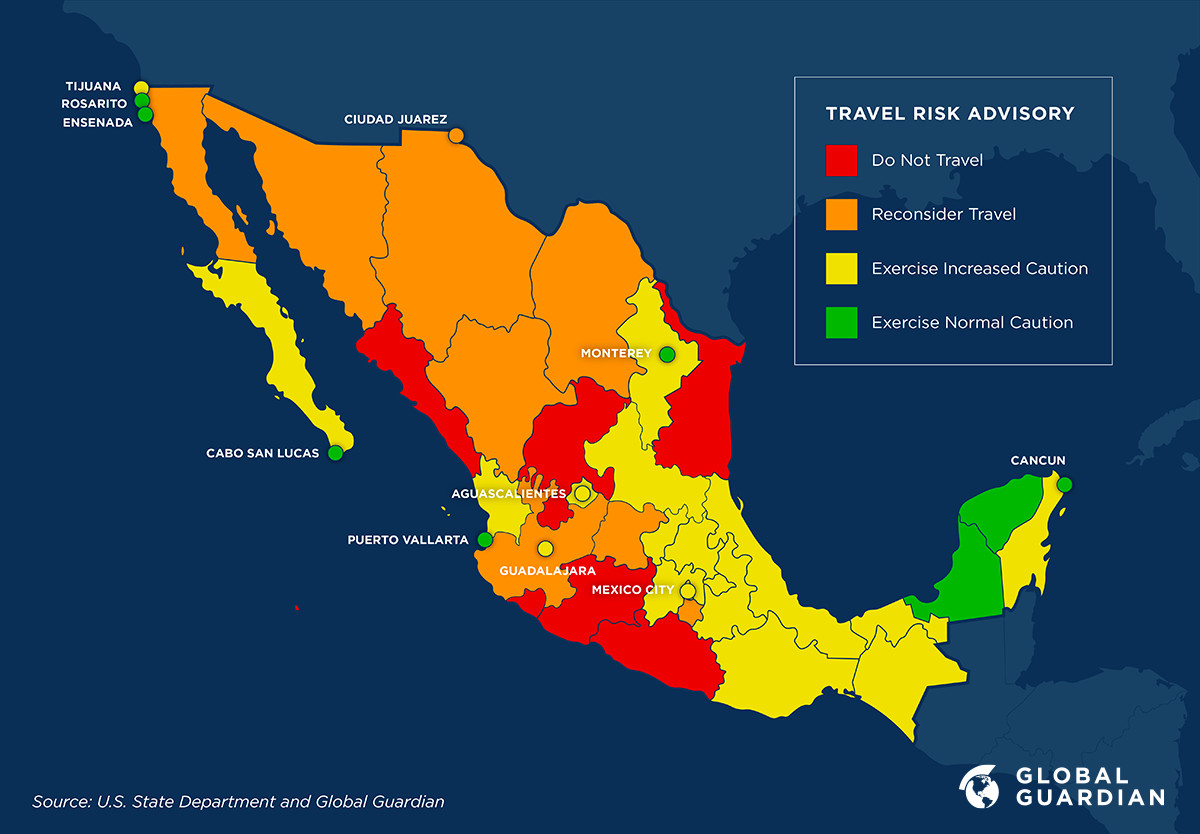Are you a member of the LGBTQ+ community planning a trip to Mexico and wondering “How Unsafe Is Mexico?” Fear not, gaymexico.net is here to guide you through the realities of travel safety in Mexico, focusing on the specific concerns and needs of LGBTQ+ travelers, offering up-to-date information and actionable advice to ensure a safe and enjoyable experience. Discover the safest destinations, understand potential risks, and learn how to navigate Mexico with confidence. We will explore LGBTQ+ safety, LGBTQ+ travel tips and safety resources.
1. Understanding Safety in Mexico: A Balanced Perspective
Is Mexico safe? While Mexico is a popular tourist destination, it’s essential to acknowledge the safety concerns that exist, especially regarding cartel-related violence and petty crime. However, focusing solely on these risks paints an incomplete picture. Many regions in Mexico are safe and welcoming for tourists, including LGBTQ+ travelers. It’s about knowing where to go and how to stay safe.
Mexico is confronting multifaceted challenges stemming from organized crime, drug trafficking, and corruption, which can lead to violence in certain regions, according to Human Rights Watch in their 2024 report. However, the impact of these issues varies significantly across the country, with some areas experiencing higher levels of risk than others.
- Cartel Activity: Cartels often vie for territorial control, particularly in border regions and strategic trafficking routes, resulting in violent confrontations.
- Petty Crime: Tourist areas are susceptible to petty crime, such as pickpocketing and scams, especially in crowded locations and public transportation hubs.
- Police Corruption: In some regions, police corruption can be an issue, leading to distrust and potential exploitation of tourists.
- Impact on Tourism: While safety concerns exist, Mexico’s tourism industry remains robust, with millions of visitors each year. The government and tourism boards actively work to ensure the safety of tourists in popular destinations.
- Regional Variations: Safety levels vary significantly from state to state and even city to city. Tourist destinations like Cancun, Puerto Vallarta, and Mexico City tend to be safer due to increased security measures and a focus on tourist safety.
To mitigate these risks, travelers should stay informed about current safety conditions in their destination, avoid high-risk areas, take precautions against petty crime, and be aware of their surroundings.
2. Is Mexico City Safe for LGBTQ+ Travelers?
Yes, Mexico City is generally considered safe for LGBTQ+ travelers, as it is one of the most progressive and welcoming cities in Latin America.
Mexico City has a vibrant LGBTQ+ scene, with numerous gay bars, clubs, and cultural events. However, like any major city, it’s essential to be aware of your surroundings and take precautions against petty crime, especially in crowded areas.
- LGBTQ+ Scene: Mexico City boasts a thriving LGBTQ+ community, particularly in neighborhoods like Zona Rosa, which is known for its gay bars, clubs, and restaurants.
- Legal Protections: Mexico City has progressive laws protecting the rights of LGBTQ+ individuals, including same-sex marriage and anti-discrimination measures.
- Public Displays of Affection: While generally accepted, it’s advisable to exercise discretion with public displays of affection, especially in more conservative areas.
- Safety Tips: Stick to well-lit and populated areas at night, avoid walking alone in unfamiliar neighborhoods, and be cautious when using public transportation.
- LGBTQ+ events: Keep an eye out for the annual Pride March in June.
 zona rosa mexico city lgbtq+
zona rosa mexico city lgbtq+
3. What Areas Should LGBTQ+ Travelers Avoid in Mexico?
While Mexico has many welcoming destinations, some areas pose higher risks. It’s best to exercise caution or avoid travel to regions known for high levels of crime and violence.
According to the U.S. State Department’s Mexico Travel Advisory, states like Tamaulipas, Guerrero, Michoacan, and Zacatecas are considered high-risk due to crime and kidnapping. While these warnings apply to all travelers, LGBTQ+ individuals may face additional risks in areas with more conservative social attitudes.
| State | Risk Level | Notes |
|---|---|---|
| Tamaulipas | Do Not Travel | High levels of crime and kidnapping, particularly in border cities like Reynosa and Nuevo Laredo. |
| Guerrero | Reconsider Travel | Home to Acapulco, but also experiences high levels of violence and organized crime. |
| Michoacan | Reconsider Travel | Known for cartel activity and violent clashes, particularly in rural areas. |
| Zacatecas | Reconsider Travel | High levels of cartel-related violence and organized crime. |
| Guanajuato | Reconsider Travel | Increasingly violent state contested by multiple organized crime groups, including the Cartel Jalisco Nueva Generacion (CJNG). |
| Baja California | Reconsider Travel | Home to popular tourist destinations of Rosarita and Ensenada in addition to Tijuana. Risk of pickpocketing and other forms of theft is higher. |
LGBTQ+ travelers should research their destination thoroughly, heed travel advisories, and prioritize safety by avoiding high-risk areas.
4. What Are Some Safe Destinations in Mexico for LGBTQ+ Travelers?
Many cities in Mexico are known for their LGBTQ+-friendly atmosphere and welcoming communities. Here are some of the safest and most popular destinations:
- Puerto Vallarta: Often called the “Gay Capital of Mexico,” Puerto Vallarta boasts a vibrant LGBTQ+ scene with numerous gay bars, clubs, and resorts. It’s known for its open and accepting atmosphere.
- Mexico City: As mentioned earlier, Mexico City is a progressive and cosmopolitan city with a thriving LGBTQ+ community.
- Cancun: While primarily known as a tourist hotspot, Cancun also has a growing LGBTQ+ scene and is generally safe for LGBTQ+ travelers, especially in tourist areas.
- Guadalajara: This city has a developing LGBTQ+ scene and is considered safer than some other parts of Jalisco state.
- San Miguel de Allende: Known for its beautiful colonial architecture and thriving arts scene, San Miguel de Allende is a welcoming and inclusive destination for LGBTQ+ travelers.
| City | LGBTQ+ Friendliness | Key Attractions |
|---|---|---|
| Puerto Vallarta | Very High | Gay beaches, bars, clubs, resorts, Malecon, Zona Romantica |
| Mexico City | High | Zona Rosa, museums, historical sites, cultural events |
| Cancun | Moderate | Beaches, resorts, nightlife, Mayan ruins |
| Guadalajara | Moderate | Historical center, cultural attractions, developing LGBTQ+ scene |
| San Miguel de Allende | High | Colonial architecture, arts scene, charming atmosphere |
These destinations offer a mix of safety, inclusivity, and LGBTQ+-specific attractions, making them ideal choices for LGBTQ+ travelers.
5. How Can LGBTQ+ Travelers Stay Safe in Mexico?
Staying safe in Mexico requires a combination of common-sense precautions and awareness of local conditions. Here are some practical tips:
- Research Your Destination: Before traveling, research the safety conditions and LGBTQ+ friendliness of your destination.
- Stay Informed: Keep up-to-date with local news and travel advisories.
- Avoid High-Risk Areas: Steer clear of areas known for high crime rates or cartel activity.
- Be Discreet: While many places are accepting, it’s wise to exercise discretion with public displays of affection, especially in more conservative areas.
- Use Reputable Transportation: Opt for reputable taxi services or ride-sharing apps.
- Protect Your Belongings: Be aware of your surroundings and take precautions against petty theft.
- Share Your Itinerary: Let friends or family know your travel plans and check in regularly.
- Learn Basic Spanish: Knowing basic Spanish can help you communicate and navigate situations more effectively.
- Trust Your Instincts: If a situation feels unsafe, remove yourself from it.
- Connect with Local LGBTQ+ Groups: Reach out to local LGBTQ+ organizations for advice and support.
| Safety Precaution | Description |
|---|---|
| Destination Research | Investigate the safety and LGBTQ+ friendliness of your destination. |
| Stay Informed | Monitor local news and travel advisories for up-to-date information. |
| Avoid High-Risk Areas | Stay away from areas known for high crime rates or cartel activity. |
| Exercise Discretion | Be mindful of public displays of affection, especially in conservative areas. |
| Reputable Transportation | Use trusted taxi services or ride-sharing apps. |
| Protect Belongings | Be aware of your surroundings and guard against petty theft. |
| Share Itinerary | Inform friends or family of your travel plans and check in regularly. |
| Basic Spanish | Learn basic Spanish phrases to communicate and navigate more effectively. |
| Trust Instincts | If a situation feels unsafe, remove yourself immediately. |
| LGBTQ+ Connections | Connect with local LGBTQ+ groups for advice and support. |
By following these tips, LGBTQ+ travelers can minimize risks and enjoy a safer and more fulfilling experience in Mexico.
6. Understanding Mexican Laws and LGBTQ+ Rights
Mexico has made significant strides in LGBTQ+ rights, with legal protections varying by state.
- Same-Sex Marriage: Same-sex marriage is legal nationwide, but the implementation varies by state.
- Anti-Discrimination Laws: Many states have anti-discrimination laws protecting LGBTQ+ individuals in areas like employment, housing, and services.
- Gender Identity: Mexico has made progress in recognizing gender identity, with some states allowing individuals to change their legal gender.
- Adoption: LGBTQ+ couples have the right to adopt in many parts of Mexico.
| Legal Right | Status |
|---|---|
| Same-Sex Marriage | Legal nationwide, but implementation varies by state. |
| Anti-Discrimination Laws | Many states have laws protecting LGBTQ+ individuals from discrimination. |
| Gender Identity | Progress in recognizing gender identity, with some states allowing legal gender changes. |
| Adoption | LGBTQ+ couples have the right to adopt in many areas. |
Understanding these laws can help LGBTQ+ travelers navigate their rights and responsibilities while in Mexico.
7. How to Find LGBTQ+-Friendly Accommodation and Venues
Finding welcoming accommodation and venues is crucial for a comfortable and enjoyable trip. Here are some tips:
- Online Research: Use websites like gaymexico.net, misterbandb, and Expedia to search for LGBTQ+-friendly hotels, guesthouses, and vacation rentals.
- Read Reviews: Pay attention to reviews from other LGBTQ+ travelers to get an idea of the atmosphere and inclusivity of a place.
- Check for Certifications: Some hotels and venues have LGBTQ+ certifications or affiliations with LGBTQ+ travel organizations.
- Ask Questions: When booking, don’t hesitate to ask about the establishment’s policies on LGBTQ+ inclusion and any specific services they offer.
- Use LGBTQ+ Guides: Consult LGBTQ+ travel guides and websites for recommendations on gay bars, clubs, restaurants, and cultural events.
| Finding Accommodation | Tips |
|---|---|
| Online Research | Use websites specializing in LGBTQ+-friendly travel. |
| Read Reviews | Look for feedback from other LGBTQ+ travelers. |
| Check Certifications | See if the establishment has LGBTQ+ certifications. |
| Ask Questions | Inquire about LGBTQ+ inclusion policies and services. |
| LGBTQ+ Guides | Consult guides and websites for recommendations on LGBTQ+ venues. |
By using these resources, LGBTQ+ travelers can find accommodation and venues where they feel safe, respected, and welcome.
8. Staying Safe on Public Transportation
Public transportation in Mexico can be a convenient way to get around, but it’s essential to take precautions to ensure your safety:
- Use Reputable Services: Opt for authorized taxis, ride-sharing apps, or established bus companies.
- Avoid Unmarked Vehicles: Be wary of unmarked taxis or informal transportation services.
- Be Aware of Your Surroundings: Pay attention to your belongings and avoid displaying valuables.
- Travel During the Day: If possible, travel during daylight hours when there are more people around.
- Share Your Route: Let someone know your route and estimated arrival time.
- Sit Near the Driver: In taxis or buses, sit in a visible location, such as near the driver.
| Public Transportation | Safety Tips |
|---|---|
| Reputable Services | Choose authorized taxis, ride-sharing apps, or established bus companies. |
| Avoid Unmarked | Be cautious of unmarked taxis or informal transportation services. |
| Be Aware | Pay attention to your belongings and avoid displaying valuables. |
| Travel During Day | Travel during daylight hours when possible. |
| Share Route | Inform someone of your route and estimated arrival time. |
| Sit Near Driver | Sit in a visible location in taxis or buses. |
By following these guidelines, you can minimize risks and travel safely on public transportation.
9. What to Do If You Experience Discrimination or Harassment
Despite Mexico’s progress, LGBTQ+ travelers may still encounter discrimination or harassment. Here’s what to do if it happens:
- Stay Calm: Try to remain calm and assess the situation.
- Document the Incident: If possible, document the incident with photos, videos, or notes.
- Report to Authorities: Report the incident to the local police or tourist authorities.
- Contact LGBTQ+ Organizations: Reach out to local LGBTQ+ organizations for support and assistance.
- Seek Legal Advice: If the incident involves a violation of your rights, consider seeking legal advice.
- Share Your Experience: Share your experience online or with travel organizations to raise awareness and help others.
| Discrimination/Harassment | Actions |
|---|---|
| Stay Calm | Remain calm and assess the situation. |
| Document Incident | Document the incident with photos, videos, or notes if possible. |
| Report to Authorities | Report the incident to the local police or tourist authorities. |
| Contact LGBTQ+ Orgs | Reach out to local LGBTQ+ organizations for support and assistance. |
| Seek Legal Advice | Consult a lawyer if your rights have been violated. |
| Share Experience | Share your experience online or with travel organizations to raise awareness and help others. |
By knowing how to respond, you can protect yourself and contribute to a safer environment for all LGBTQ+ travelers.
10. Resources for LGBTQ+ Travelers in Mexico
Numerous organizations and resources can help LGBTQ+ travelers plan and navigate their trips to Mexico:
- gaymexico.net: A comprehensive website with information on LGBTQ+ travel, events, and resources in Mexico.
- UCLA Williams Institute: Research on LGBTQ+ issues and demographics, providing valuable data on LGBTQ+ populations in Mexico.
- Human Rights Watch: Reports on human rights issues in Mexico, including LGBTQ+ rights.
- Local LGBTQ+ Organizations: Organizations like All Out and ILGA provide support and advocacy for LGBTQ+ individuals in Mexico.
- Travel Guides: LGBTQ+ travel guides like Damron and Out Traveler offer recommendations on LGBTQ+-friendly destinations and venues.
| Resource | Description |
|---|---|
| gaymexico.net | Website with LGBTQ+ travel information, events, and resources in Mexico. Address: 3255 Wilshire Blvd, Los Angeles, CA 90010, United States. Phone: +1 (213) 380-2177. Website: gaymexico.net |
| UCLA Williams Institute | Research on LGBTQ+ issues and demographics. |
| Human Rights Watch | Reports on human rights issues in Mexico, including LGBTQ+ rights. |
| Local LGBTQ+ Orgs | Organizations providing support and advocacy for LGBTQ+ individuals in Mexico (e.g., All Out, ILGA). |
| Travel Guides | LGBTQ+ travel guides with recommendations on destinations and venues (e.g., Damron, Out Traveler). |
These resources can provide valuable information and support to help you plan a safe and enjoyable trip.
FAQ: Addressing Your Safety Concerns About Traveling to Mexico
Still have questions? Here are some frequently asked questions about safety for LGBTQ+ travelers in Mexico:
- Is Mexico generally safe for tourists? Yes, many parts of Mexico are safe for tourists, but it’s essential to research your destination and take precautions.
- Is Mexico City safe for LGBTQ+ travelers? Yes, Mexico City is generally considered safe and welcoming for LGBTQ+ travelers.
- What areas should LGBTQ+ travelers avoid in Mexico? Avoid high-risk states like Tamaulipas, Guerrero, and Michoacan.
- How can I find LGBTQ+-friendly accommodation? Use websites like gaymexico.net and read reviews from other LGBTQ+ travelers.
- What should I do if I experience discrimination? Stay calm, document the incident, and report it to authorities and LGBTQ+ organizations.
- Is same-sex marriage legal in Mexico? Yes, same-sex marriage is legal nationwide, but implementation varies by state.
- What are some safe destinations for LGBTQ+ travelers? Puerto Vallarta, Mexico City, and Cancun are popular and safe choices.
- How can I stay safe on public transportation? Use reputable services, avoid unmarked vehicles, and be aware of your surroundings.
- Are there anti-discrimination laws in Mexico? Many states have anti-discrimination laws protecting LGBTQ+ individuals.
- What resources are available for LGBTQ+ travelers in Mexico? gaymexico.net, UCLA Williams Institute, and local LGBTQ+ organizations can provide valuable information and support.
 mexico pride
mexico pride
Mexico offers a rich and diverse travel experience for LGBTQ+ individuals, and by staying informed and taking precautions, you can ensure a safe and memorable trip.
Ready to explore the beauty and vibrancy of Mexico? Visit gaymexico.net now to discover detailed travel guides, find exciting events, and connect with the LGBTQ+ community in Mexico and the US. Your adventure awaits! Address: 3255 Wilshire Blvd, Los Angeles, CA 90010, United States. Phone: +1 (213) 380-2177. Website: gaymexico.net. Plan your dream trip with confidence and experience the warmth and hospitality of Mexico! Embrace Mexican culture, find a gay bar, and experience the local destinations!
